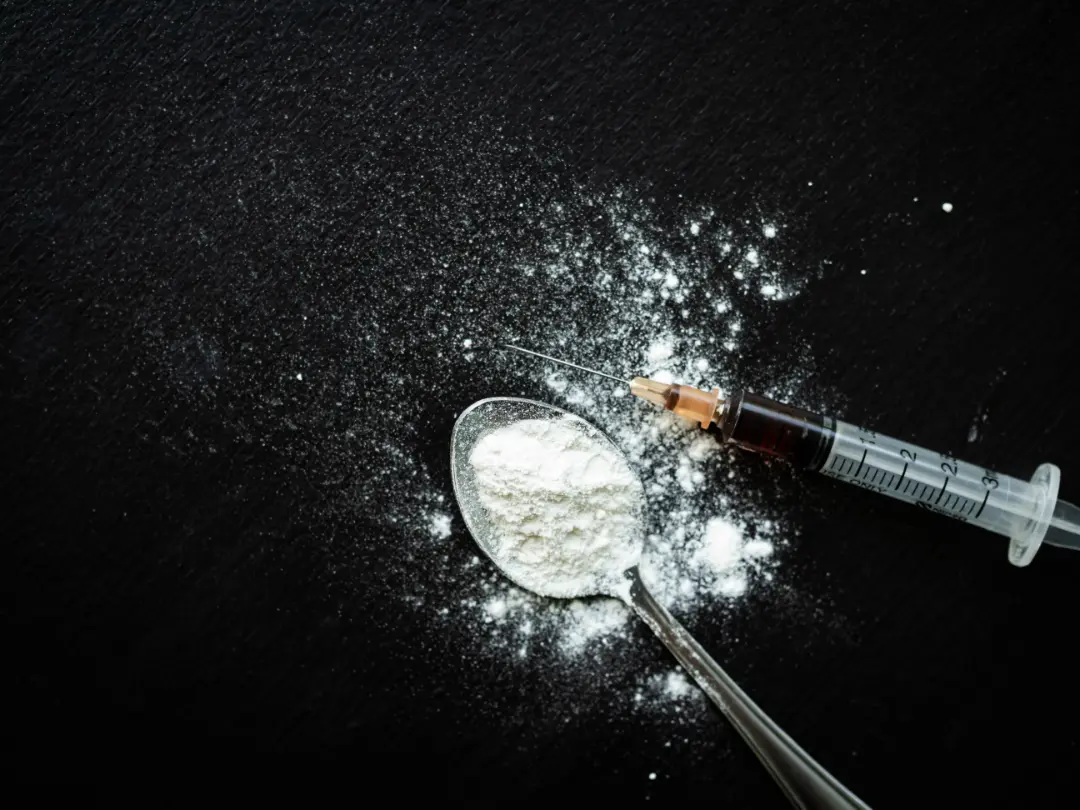Is cocaine addictive? Yes, cocaine is highly addictive due to its intense effects on the brain’s reward system.
In this article, we will explore why cocaine is so addictive, its impacts on the brain and body, and the available treatment options.
Key Takeaways
- Cocaine is a highly addictive stimulant that affects brain chemistry, leading to significant psychological and physical health risks.
- Withdrawal from cocaine can lead to intense cravings, mood disturbances, and other psychological symptoms, highlighting the need for effective treatment strategies.
- Successful treatment for cocaine addiction involves a combination of behavioral therapies, family support, and a continuum of care to ensure long-term recovery and prevent relapse.
What Is Cocaine?
Cocaine is an illegal, highly addictive stimulant derived from the leaves of the coca plant, primarily grown in Colombia, Peru, and Bolivia.
This potent stimulant is commonly found in two forms: cocaine powder 1and crack cocaine 2. Cocaine powder, often referred to as “coke,” is usually snorted, while crack cocaine is smoked, leading to a quicker and more intense high.
Historically, cocaine was utilized in medicine for its anesthetic properties before its addictive nature became widely recognized 3. Today, the production of cocaine largely takes place in clandestine labs in South America, where coca leaves are processed into white powder or crack form.
Recognizing the origins and forms of cocaine helps in understanding its profound impact on individuals and society.

How Does Cocaine Affect the Brain?
Cocaine’s primary psychoactive effects are due to a surge of dopamine in the brain’s limbic system, particularly in the nucleus accumbens, which governs pleasure and motivation. Cocaine disrupts the normal reabsorption of dopamine 4by blocking the dopamine transporter, leading to an excess of dopamine receptors in the synaptic cleft. This flood of dopamine induces feelings of euphoria, alertness, and increased energy, making the drug highly addictive.
That intense rush or burst of energy you may feel after using cocaine comes from this dopamine overload. But because your brain isn’t reabsorbing dopamine normally, the high is short-lived, often followed by a crash that leaves you craving more.
The immediate effects of cocaine are intensely pleasurable, but repeated use can lead to significant neurobiological changes. Chronic use of cocaine results in long-term alterations in gene expression within the brain 5, which contributes to addiction. These changes affect how cocaine affects the body’s response to the drug, making it increasingly difficult to achieve the same high, thus driving users to consume larger amounts.
Over time, you may notice that it takes more cocaine to feel anything close to that first high. This isn’t just tolerance but your brain adapting at a deep level, rewiring itself in ways that make breaking free from the cycle even harder without support.
Why Is Cocaine So Addictive?
Cocaine drug addiction stems from the drug’s powerful effects on the brain’s pleasure centers, leading to pleasurable feelings. The release of dopamine creates a euphoric rush that users find incredibly enticing.
This initial sense of well-being is accompanied by increased energy, excitement, and confidence, which can be highly appealing.
However, as we’ve already stated, the high from cocaine is fleeting, often lasting only a short period. This brevity leads users to take more cocaine soon after to recapture the euphoric feeling and experience pleasure. Each successive use heightens the risk of developing an addiction, with some individuals becoming addicted after just a single use.
As users continue to seek the elusive high, they often find themselves trapped in an uncontrollable cycle of use and addiction. Severe withdrawal symptoms, including intense craving and mood disturbances, further exacerbate this cycle, making it incredibly challenging to break free from cocaine addiction.
Cocaine Tolerance and Dependence
One of the most insidious aspects of cocaine addiction is the rapid development of tolerance. With regular use, individuals require increasingly larger doses to achieve the same euphoric effect. This escalating need for higher amounts of cocaine significantly increases the risk of overdose and adverse side effects.
Dependence on cocaine can develop very quickly 6, often faster than with many other drugs. As the brain and central nervous system adapt to the presence of cocaine, the same changes in brain cells persist long after use has ceased, potentially leading to lasting addiction-related behaviors associated with long-term cocaine abuse.
Recognizing the dynamics of tolerance and dependence helps in understanding the severity of cocaine addiction and the need for timely intervention.
Physical and Psychological Effects of Cocaine Use
Cocaine use poses severe physical health risks, including high blood pressure, nausea, excessive sweating, and breathing problems 7.
The stimulating effects of cocaine can lead to dangerously high heart rates and, in extreme cases, heart attacks or strokes 8. The presence of adulterants 9in cocaine can further exacerbate these harmful effects.
Psychologically, cocaine use can induce severe psychiatric symptoms such as agitation, paranoia, and hallucinations 10. Paranoia can last from a few hours to several weeks, depending on the individual. Cocaine-induced psychosis, characterized by hallucinations and delusions, affects a notable portion of users, significantly impacting their mental health.
The impulsivity and poor decision-making associated with cocaine use can lead to risky behaviors and long-term psychological harm. Delirium, characterized by confusion and severe autonomic instability, can also occur.
If you’ve experienced chest pains, paranoia, or felt out of touch with reality after using cocaine, these are real, dangerous effects. Cocaine doesn’t just damage your body; it can deeply disrupt your mind, leading to unpredictable and frightening experiences that may worsen over time.

Cocaine Withdrawal Symptoms
Cocaine withdrawal symptoms 11can be intensely challenging, encompassing cravings, depression, irritability, and fatigue. Common withdrawal symptoms also include agitation, increased appetite, and mood swings, particularly during the first week. These symptoms are often most severe immediately after the last use of the drug.
For most people, after about ten weeks, most withdrawal symptoms significantly diminish, providing some relief for those in recovery.
External factors such as environment and peer influence can impact the severity of withdrawal symptoms, making a supportive recovery environment a key factor in the process.
Treatment Options for Cocaine Addiction
Effective treatment for cocaine addiction must address both the physical and psychological cravings for the substance.
This includes managing withdrawal symptoms and tackling underlying psychological issues such as anxiety and depression.
Comprehensive cocaine addiction treatment options include cocaine detox, residential treatment, and outpatient programs, all of which focus on evidence-based practices.

Break Free from Cocaine Addiction with Compassionate, Expert Care at Charles River Recovery
If you or someone you love is struggling with cocaine addiction, recovery is possible. At Charles River Recovery in Weston, MA, we understand the intense psychological and physical grip cocaine can have.
We offer evidence-based cocaine detox and residential treatment programs designed to support your recovery from the very first day. Under the guidance of Dr. Salah Alrakawi, our dual board-certified medical director, we provide 24/7 medical supervision in a safe, state-of-the-art facility, helping you safely manage withdrawal symptoms while restoring your health and well-being.
At Charles River Recovery, our comprehensive treatment model includes detoxification, Clinical Stabilization Services (CSS), cognitive behavioral therapy (CBT), dialectical behavior therapy (DBT), individual counseling, group therapy, family therapy, and wellness activities.
We treat more than the addiction. We treat the whole person. Whether you’re experiencing intense cravings, mood swings, or physical complications, our skilled team is here to support you with compassion and personalized care every step of the way.
Don’t wait until addiction takes more from you. Contact Charles River Recovery today at (844) 441-0455 or fill out our confidential contact form to take the first step toward a healthier, drug-free life.
The Role of Behavioral Therapy in Recovery
Cognitive Behavioral Therapy (CBT) 12effectively treats substance abuse disorders by:
- Helping individuals recognize drug use triggers
- Helping individuals understand the consequences of their actions
- Developing skills to resist drug cravings
- Managing high-risk situations related to drug abuse
Contingency Management 13, another effective behavioral therapy, includes the following components:
- Rewarding individuals for clean urine tests with tokens redeemable for healthy lifestyle incentives.
- Therapists teach coping skills for triggers to help patients manage their addiction.
- Using former addicts as group leaders makes the treatment more relatable and effective, as reflected in testimonials.
Importance of Long-Term Support for Sustained Recovery
Ongoing support is essential for maintaining recovery. At Charles River Recovery, we recognize that lasting sobriety is built on strong foundations and ongoing encouragement.
We offer a comprehensive Alumni Program designed to help individuals maintain progress, stay accountable, and feel empowered throughout every stage of recovery. Whether you’ve completed detox, residential treatment, or outpatient care, our alumni services are tailored to keep you actively engaged and connected to resources that reinforce your commitment to a drug-free life.
Our Alumni Program offers a structured yet flexible support system that meets the evolving needs of individuals after they leave our facility. We foster a safe space for continued healing through peer interaction, professional guidance, and purposeful activities that inspire personal growth and prevent relapse.
When you complete your treatment, you are not just discharged from a program but become part of a supportive community that genuinely cares.
Our Alumni Program highlights include:
- Regular Check-Ins: Stay connected with ongoing follow-up calls and progress assessments with our care team.
- Continued Education Workshops: Attend virtual or in-person sessions on topics like relapse prevention, stress management, and mindfulness.
- Peer Support Groups: Join weekly alumni meetings to share experiences, challenges, and triumphs in a judgment-free environment.
- Sober Social Events: Reconnect through community-building activities like alumni dinners, outings, and service projects.
- Recovery Coaching: Gain access to mentors who have walked the recovery path and provide personal support and accountability.
- Private Alumni Network Access: Engage with fellow graduates through our secure online platform for daily motivation and resources.
At Charles River Recovery, you’re never alone. Our Alumni Program is your ongoing partner in recovery, rooted in connection, built on trust, and committed to helping you live a fulfilling, substance-free life.
Accessible and Insurance-Friendly Intake
Charles River Recovery offers:
- Round-the-clock access to treatment, ensuring patients can seek help at any time.
- Acceptance of most insurance plans makes it easier for individuals to start their recovery journey.
- Transportation assistance helping clients reach treatment facilities conveniently.
Charles River Recovery provides a comprehensive care environment with 24/7 medical oversight, comfortable facilities, flexible programs, and full insurance acceptance. This accessibility ensures that individuals seeking recovery can find the support they need when they need it most.
The Importance of Family and Community in Recovery
Family support is vital for individuals in recovery, significantly aiding their ability to achieve and maintain sobriety. Establishing healthy boundaries within family relationships supports recovery and prevents relapse. Family therapy improves communication and resolves conflicts in families dealing with addiction.
Family programs provide education about addiction and facilitate healing within family units affected by a loved one’s substance use.
Frequently Asked Questions
What is cocaine, and where does it come from?
Cocaine is a highly addictive stimulant extracted from the leaves of the coca plant, predominantly found in Colombia, Peru, and Bolivia. Its illegal status and potency contribute to significant concerns regarding substance abuse and health risks.
How does cocaine affect the brain?
Cocaine significantly alters brain function by preventing the reabsorption of dopamine, which causes an overwhelming surge of this neurotransmitter.
This disruption leads to intense euphoria, increased energy, and heightened alertness, ultimately affecting mental health and behavior.
Why is cocaine so addictive?
Cocaine is highly addictive due to its ability to produce intense feelings of euphoria, while its short effects prompt users to chase that high repeatedly.
This pattern can quickly lead to tolerance and addiction, making it a dangerous substance even after just one use.
What are some common symptoms of cocaine withdrawal?
Common symptoms of cocaine withdrawal include intense cravings, depression, irritability, fatigue, mood swings, and sleep disturbances, which can be severe immediately after last use and may last for several weeks. Understanding these symptoms is crucial for effective recovery.
What treatment options are available for cocaine addiction?
Cocaine addiction can be effectively treated through a combination of detoxification, residential or outpatient programs, and behavioral therapies like Cognitive Behavioral Therapy and Contingency Management.
These approaches aim to address both the physical and psychological components of addiction.
Conclusion
Cocaine addiction is a complex and devastating condition that requires a multifaceted approach to treatment. Understanding the risks and effects of cocaine use, recognizing the symptoms of withdrawal, and knowing the available treatment options are crucial steps toward recovery. Behavioral therapy, family support, and long-term care play pivotal roles in sustaining sobriety.
Charles River Recovery stands out for its comprehensive, compassionate approach to addiction treatment. With expert clinicians, evidence-based therapies, and a supportive environment, individuals can find the help they need to overcome cocaine addiction. Our combination of professional expertise and genuine care creates a healing atmosphere that fosters lasting recovery.
The journey to recovery is challenging, but with the right support and resources, it is possible to reclaim one’s life from the grip of cocaine addiction. Take the first step towards a brighter future by seeking help today.
Disclaimer
The content in this article is for informational purposes only and is not intended to replace professional medical advice, diagnosis, or treatment. Always seek the advice of your physician or qualified healthcare provider with any questions regarding a medical condition.
Never disregard medical advice or delay seeking it because of something you have read here. Charles River Recovery disclaims all liability for any loss or risk incurred, directly or indirectly, from reliance on any information provided. If you or someone you know is experiencing a medical emergency or mental health crisis, please call 911 or seek immediate professional assistance.
Sources
- https://www.justice.gov/archive/ndic/pubs3/3951/index.htm
- https://www.justice.gov/archive/ndic/pubs3/3978/index.htm
- https://pmc.ncbi.nlm.nih.gov/articles/PMC4335732/
- https://pmc.ncbi.nlm.nih.gov/articles/PMC4662164/
- https://pmc.ncbi.nlm.nih.gov/articles/PMC2851032/
- https://pmc.ncbi.nlm.nih.gov/articles/PMC2815181/
- https://www.drugsandalcohol.ie/15768/1/Cocaine_the_facts.pdf
- https://pmc.ncbi.nlm.nih.gov/articles/PMC6387265/
- https://www.sciencedirect.com/science/article/abs/pii/S0379073818300446
- https://www.sciencedirect.com/topics/neuroscience/cocaine-induced-psychosis
- https://pubmed.ncbi.nlm.nih.gov/15925122/
- https://pmc.ncbi.nlm.nih.gov/articles/PMC2897895/
- https://pmc.ncbi.nlm.nih.gov/articles/PMC4504189/


